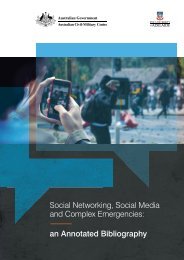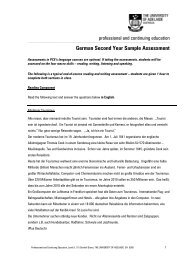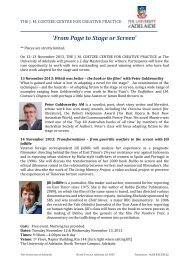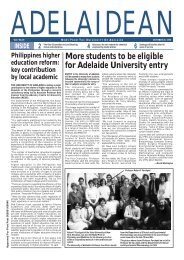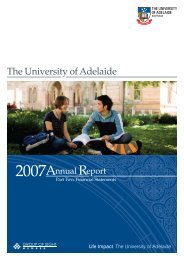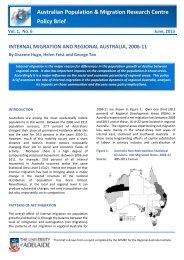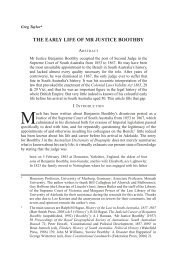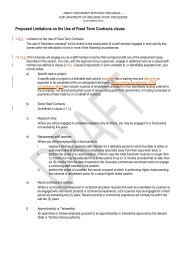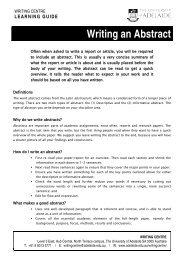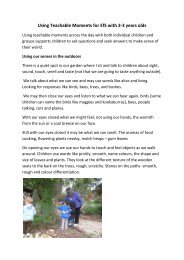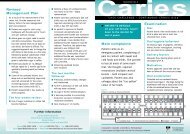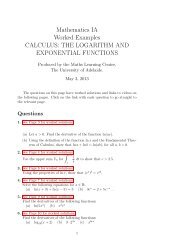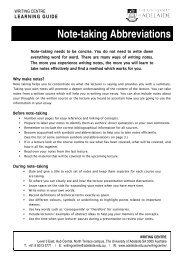Unbridling the Tongues of Women - The University of Adelaide
Unbridling the Tongues of Women - The University of Adelaide
Unbridling the Tongues of Women - The University of Adelaide
You also want an ePaper? Increase the reach of your titles
YUMPU automatically turns print PDFs into web optimized ePapers that Google loves.
<strong>Unbridling</strong> <strong>the</strong> tongues <strong>of</strong> women<br />
porter <strong>of</strong> her campaign for proportional representation. 72 Alice Henry, like Jeanne<br />
Young, shared many <strong>of</strong> Spence’s political views and regarded her as a mentor. Rose<br />
Scott and Vida Goldstein looked to her as <strong>the</strong> pioneer <strong>of</strong> much that <strong>the</strong>y aspired to<br />
<strong>the</strong>mselves. 73 <strong>The</strong>se people were probably her closest friends, outside her household,<br />
and her friends were as important to her as she was to <strong>the</strong>m: ‘no woman in Australia’,<br />
she declared toward <strong>the</strong> end <strong>of</strong> her life, ‘has been richer in friends’. 74 Yet those friendships<br />
were characterised by a kind <strong>of</strong> pr<strong>of</strong>essionalism: <strong>the</strong>y were important to her<br />
primarily as a means <strong>of</strong> sharing her opinions, her enthusiasms, and gaining support<br />
and recognition for her work; any emotional bonds seem to have arisen from this,<br />
ra<strong>the</strong>r than generating it. Most unusually for a woman <strong>of</strong> her period, she identified<br />
her fulfilment and happiness not with any private and personal relationship, but<br />
with her ambition and work, her ideas and ideals.<br />
If her aspirations and her work were her greatest passions, one <strong>of</strong> her strongest<br />
emotions was admiration for people whose work and ideas informed her own. She<br />
revered J. S. Mill, Thomas Hare, George Eliot, and later and less expressly Samuel<br />
Butler, Henry George, Edward Bellamy, and Charlotte Perkins Gilman. 75 She prized<br />
her acquaintance with Mill, Hare and George, recounted her meetings with <strong>the</strong>m,<br />
and strove for <strong>the</strong> implementation <strong>of</strong> those <strong>of</strong> <strong>the</strong>ir ideas that she had grasped most<br />
strongly. In doing so, she encountered <strong>the</strong> conventions and prohibitions which restricted<br />
her achievement, not because she lacked ability, but because she was a woman.<br />
Ca<strong>the</strong>rine Spence worked throughout her life to overcome <strong>the</strong> patriarchal conventions<br />
which threatened to thwart her ambition, restrict her self-fulfilment and<br />
prevent <strong>the</strong> achievement <strong>of</strong> her ends. She protested against social prohibitions chiefly<br />
because <strong>the</strong>y hampered her work, work she considered to be directed as much<br />
towards <strong>the</strong> greater welfare <strong>of</strong> society as towards her own fulfilment. Yet in doing<br />
so she expressed, by example as much as by precept, her opinion that women could<br />
take a place in <strong>the</strong> world beyond <strong>the</strong>ir households, and accept responsibility in <strong>the</strong><br />
public affairs <strong>of</strong> <strong>the</strong> community. By venturing into such exclusively masculine preserves<br />
as journalism and politics herself, she expressed her conviction that women, so<br />
inclined, could contribute quite as usefully as men to any field <strong>of</strong> human endeavour.<br />
It was far from easy even to express such a conviction during <strong>the</strong> 19 th century, much<br />
less to act upon it. Much <strong>of</strong> Spence’s assertiveness and self-importance probably grew<br />
out <strong>of</strong> <strong>the</strong> necessity <strong>of</strong> claiming <strong>the</strong> hearing and attention automatically accorded to<br />
most men. But her self-confidence supported her in such a claim, and by making it<br />
on behalf <strong>of</strong> o<strong>the</strong>r women she became Australia’s first feminist.<br />
20



